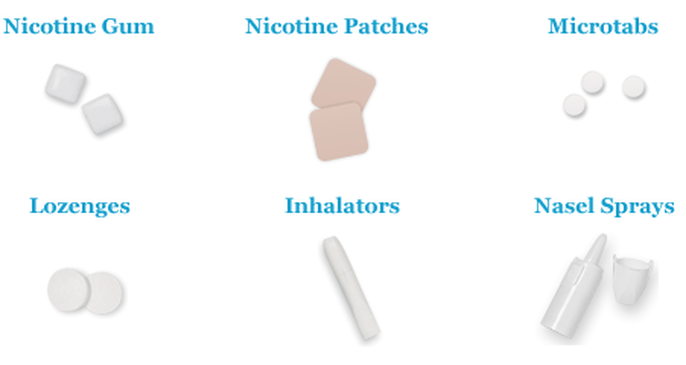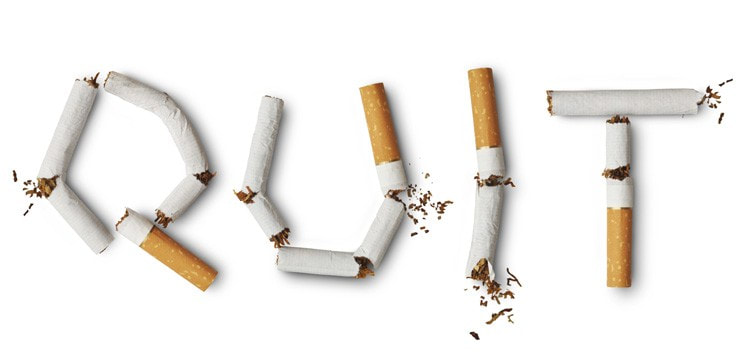
If you are a cigarette smoker, you already know what I’m going to say, QUIT! You’ve probably heard this piece of advice before and maybe you’ve tried to quit multiple times without success. You already know the health risks of Lung, mouth and throat cancer, emphysema, and COPD. You are aware of the yellow stains on your teeth, the nagging cough that never goes away, and the damage to your skin. Maybe you think you can’t quit, maybe you’re scared to try, or maybe quitting hasn’t even crossed your mind. There are plenty of options for helping you quit smoking, but which ones work and which don’t?
We all know that quitting smoking can significantly reduce your risks for heart disease and lung cancer. After only 12 weeks your lungs regain the ability to ‘clean’ themselves, and in only a year it will halve the risk of heart disease. It will also save the pack-a-day smoker approximately four thousand dollars a year. So, how do you do it?

Prepare to Quit
Think of this stage as getting pumped to quit. Some find it easy to write down a list or keep a journal, thinking about things like “What don’t I like about smoking?” or “What do I miss out on when I smoke?” The best piece of advice for quitting would be to plan for cravings and triggers.
 11 Ways to Bust Cravings and Cope with Stress 11 Ways to Bust Cravings and Cope with Stress
- Review your reasons for quitting, what did you journal about?
- Do something different, when you feel a craving, stop what you are doing and try something else.
- Exercise, it releases endorphins which will give your mood a boost and squash those cravings
- Try breathing exercises
- Call or text someone, using the support of friends or family will lift your spirits and strengthen your resolve to quit.
- Keep your Mouth busy! Chew a stick of gum, suck on lollipops or chew sunflower seeds.
- Chug a glass of water
- Have a portable Hobby, find something to do that can keep you busy and refocus your brain in short spurts, knitting, reading, and doing crossword puzzles are all things that work the brain and keeps your hands busy.
- Eat a healthy Snack. Fruit, yogurt, crackers and veggies are healthy ways to keep your mouth and mind busy. It will also help stabilize your blood sugar, fluctuations in glucose levels can intensify cravings.
- Try sucking on a lime, and chewing on its skin, the results will be comparable to chewing on 2 Mg of Nicotine gum and is an excellent source of Vitamin C
- Avoid Alcohol. Drinking can lower self-restraint and shake your resolve. Avoid alcohol in your first two weeks of quitting decreasing the chance of a relapse.
Nicotine Replacement Therapy (NRT)
According to the National Institute of Health, Nicotine Replacement therapy is the MOST commonly used method for quitting. NRT reduces both cravings and withdrawal symptoms by giving you small, controlled amounts of Nicotine, while withholding all the other harmful chemicals found in cigarettes.
NRT comes in a variety of forms and can be used in different ways. Research shows that Nicotine Replacement therapy is safe and effective and can be an important part of every smoker’s quit strategy.
Types of NRT

Prescription Quitting Aids
Medications like Chantix can curb cravings and make smoking less satisfying. Other prescriptions, like Wellbutrin can ease withdrawal symptoms, such as depression and issues concentrating. Your insurance company may require you to take a Smoking Cessation Class before paying for Chantix and prescriptions like it, to find out more, contact the customer service desk at your insurance company.
Smoking Cessation Groups
Finding a smoking cessation program is easy! Talk to your primary care physician, your local health department, or even your employer. You can also call The National Cancer Institute Quitline at 877-448-7848, The American Cancer Society Quitline at 800-227-2345, the Idaho quit line at 1-800-784-8669, or The American Lung Association, which has online and phone advice programs.
Having a group of people who are there to support you, and going through the same thing can make quitting easier. The best programs combine numerous approaches to quitting and can help target fears and road blocks that often occur when you are trying to quit.

The most important thing to remember when you are quitting is that you will make mistakes and that is okay. It is normal to slip once and awhile and smoke a cigarette, the important thing is to keep trying and making an effort to quit. Don’t give up on quitting.
|


